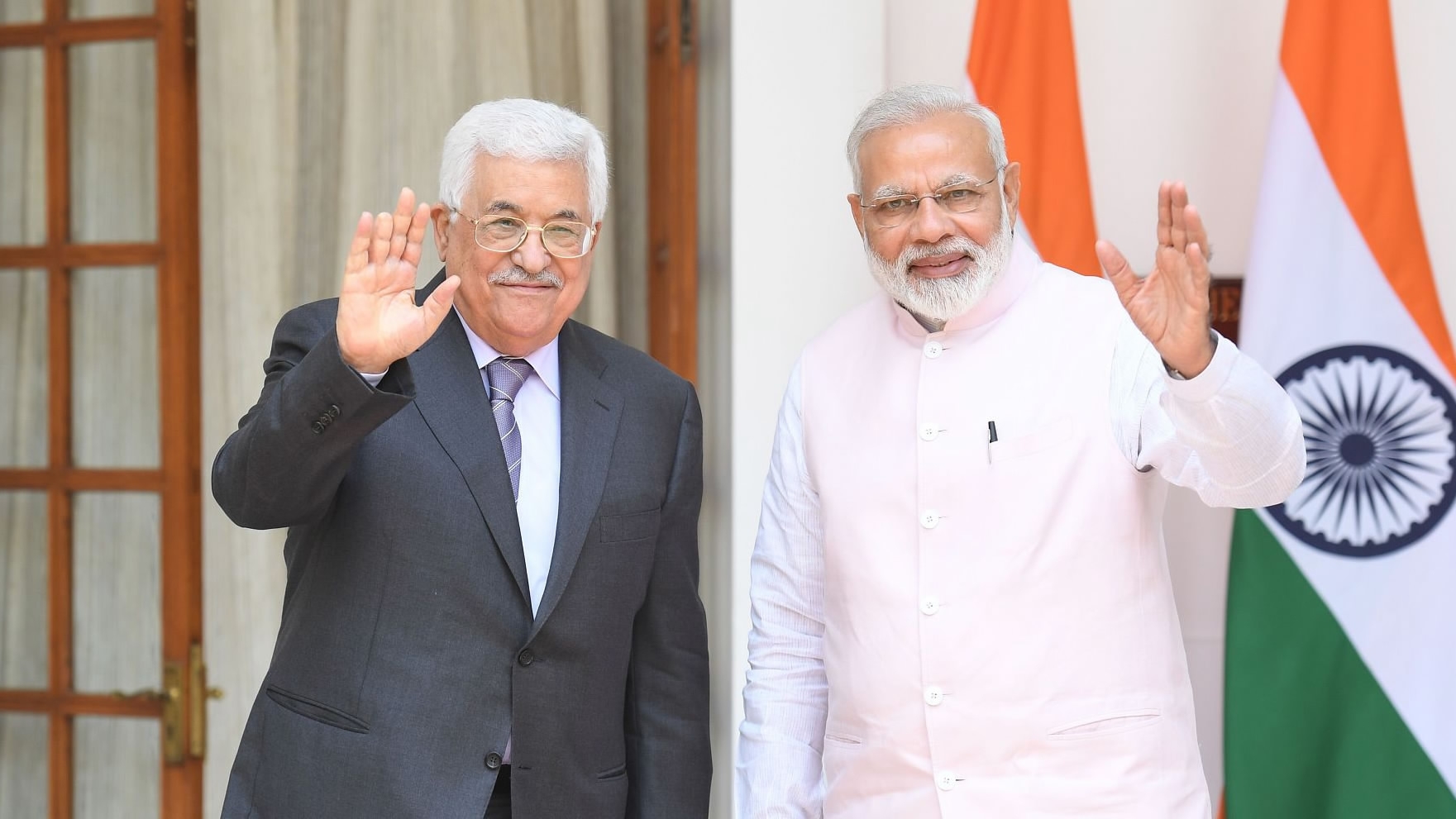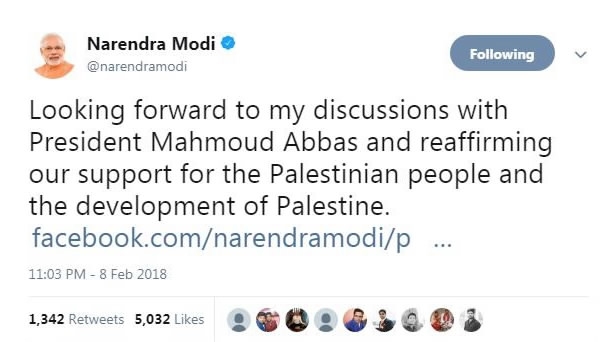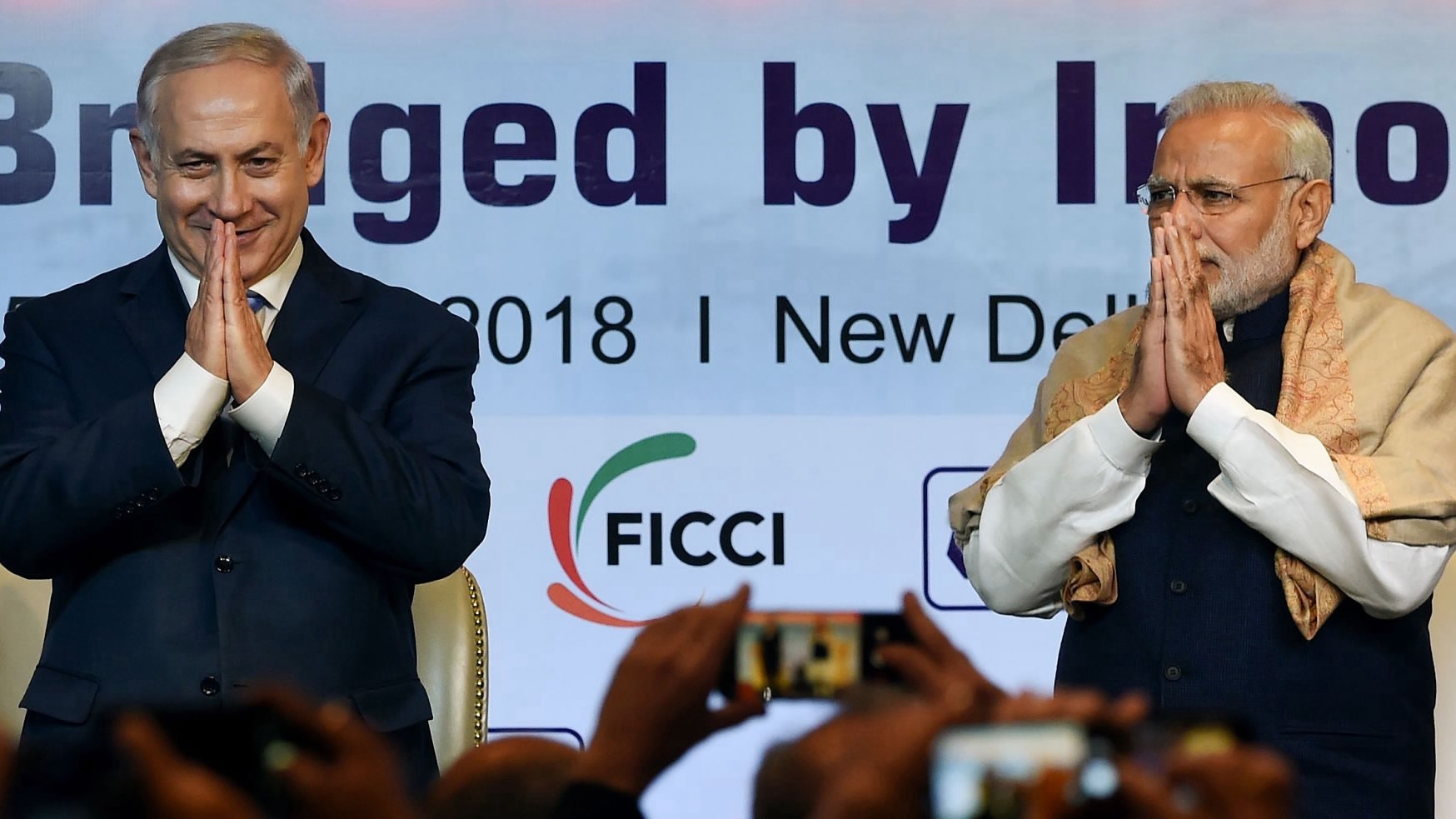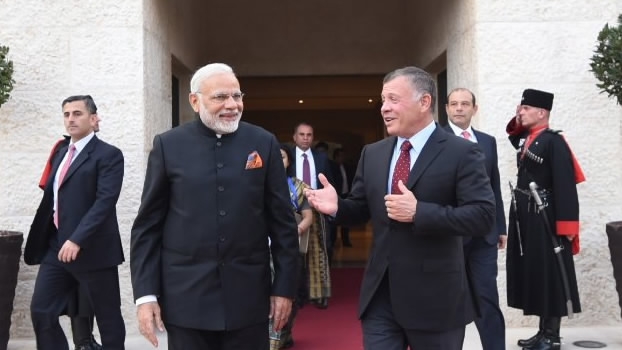
World
11:36, 10-Feb-2018
Modi to start Palestinian tour after tribute at Arafat's mausoleum
By Abhishek G Bhaya

Narendra Modi will begin his visit to the Palestinian Territories on Saturday – a first by an Indian prime minister – by paying tribute to former Palestinian leader Yasser Arafat.
Modi is scheduled to arrive in the West Bank city of Ramallah, the seat of the Palestinian government, on Saturday. He will lay a wreath on Arafat’s tomb and attend an official welcoming ceremony before heading for talks with Palestinian President Mahmoud Abbas.

A screenshot of the tweet from Indian Prime Minister Narendra Modi.
A screenshot of the tweet from Indian Prime Minister Narendra Modi.
“Looking forward to my discussions with President Mahmoud Abbas and reaffirming our support for the Palestinian people and the development of Palestine," Modi said in a Twitter post ahead of the start of his visit.
The two sides are building an Indian-Palestinian technology park in Ramallah, which will develop IT expertise and generate employment. The leaders are expected to discuss information technology, health and tourism. Modi will also address a joint press conference and attend a banquet.
Balancing act?
Modi’s visit assumes significance as it comes just weeks after he hosted Israeli Prime Minister Benjamin Netanyahu in New Delhi, and is being seen as an attempt to balance India’s decades-old support for the Palestinians against its recent closeness to Israel.
Modi also became the first Indian leader to visit Israel last July, but didn’t travel to the Palestinian headquarters at the time as is usually the case with visiting foreign leaders.

Indian Prime Minister Narendra Modi (right) and Israeli Prime Minister Benjamin Netanyahu during the India-Israel Business Summit in New Delhi on January 15, 2018. /VCG Photo
Indian Prime Minister Narendra Modi (right) and Israeli Prime Minister Benjamin Netanyahu during the India-Israel Business Summit in New Delhi on January 15, 2018. /VCG Photo
India’s foreign ministry has stressed though that despite the current visit being his first, Modi has met Abbas on three previous occasions.
India has traditionally supported a two-state solution for the Middle Eastern crisis which envisions an independent Palestinian state coexisting peacefully with Israel. Modi has continued with that policy and backed the Palestinian calls for nationhood.
In December, India joined 127 countries at the United Nations to vote against the US decision to recognize Jerusalem as Israel’s capital, in a sign of its consistent and unwavering support for the Palestinian cause.
Despite being one of the earliest champions of the Palestinian cause, New Delhi has lately turned to Israel for high-tech military equipment and anti-terrorism cooperation. Modi’s nationalist Bharatiya Janata Party (BJP) sees Israel as a natural ally against Islamist extremism.
Israel is among India's top three arms suppliers, doing business worth millions of dollars each year. Modi and Netanyahu are also pushing for cooperation in agriculture, energy and cyber-security in addition to defense.
Indian officials, however, reiterated India’s continued support to the Palestinian cause and stressed that Modi's visit is aimed at helping build up the Palestinians' capacity in the areas of health, information technology and education.
"We have de-hyphenated our relations with Palestine and Israel and now we see them both as mutually independent and exclusive and as part of this policy the prime minister is undertaking this visit," B. Bala Bhaskar, a joint secretary in the Indian foreign ministry, told the media.
Outreach to Jordan, UAE and Oman

Indian Prime Minister Narendra Modi and Jordanian King Abdullah II met in Amman, Jordan, on February 9, 2018. /Photo via PMO India
Indian Prime Minister Narendra Modi and Jordanian King Abdullah II met in Amman, Jordan, on February 9, 2018. /Photo via PMO India
Earlier on Friday, Modi stopped over in Jordan, where he met King Abdullah II. The Indian prime minister later took to Twitter to thank the Jordanian King for facilitating his smooth transit to the Palestinian Territories.
“Landed in Amman. I thank His Majesty King Abdullah II of Jordan for facilitating the transit,” Modi tweeted.
Later, after meeting the Jordanian King, he tweeted their photos with the message: “Had a wonderful meeting with His Majesty King Abdullah II of Jordan. Our discussions today will give great strength to India-Jordan bilateral relations.”
Modi will also travel to the United Arab Emirates, from where India gets half of its oil, and to Oman, with which India's navy has built close security ties.
The Gulf is home to 9 million Indians who remit over 35 billion US dollars home each year, sustaining millions of families. The UAE committed an investment worth 75 billion US dollars in India when Modi visited in 2015 and the two sides will be looking to advance that goal, the foreign ministry said.
“At the invitation of the leadership of the UAE, I will be addressing the 6th edition of the @WorldGovSummit in Dubai, where India is the Guest Country of Honour,” Modi had said in a series of tweets ahead of this trip.
“There will be interactions with leading UAE and Arab CEOs in Dubai on the vast economic opportunities in India and what more can be done together to increase business collaboration,” he added.
“Oman is a close maritime neighbor with whom we enjoy excellent relations. I will hold talks with His Majesty the Sultan of Oman and other leaders. There shall be interactions with businesspersons of Oman on developing stronger economic links with India,” he said.
“In both Oman and the UAE, I will have the opportunity to meet the large Indian diasporas that have made those countries their home. The Indian diaspora is a bridge of friendship between India and the Gulf countries,” Modi stressed.
(With input from agencies)
[Cover photo: Palestinian leader Mahmoud Abbas (left) and Indian Prime Minister Narendra Modi in New Delhi on May 16, 2017. /VCG Photo]
7121km

SITEMAP
Copyright © 2018 CGTN. Beijing ICP prepared NO.16065310-3
Copyright © 2018 CGTN. Beijing ICP prepared NO.16065310-3